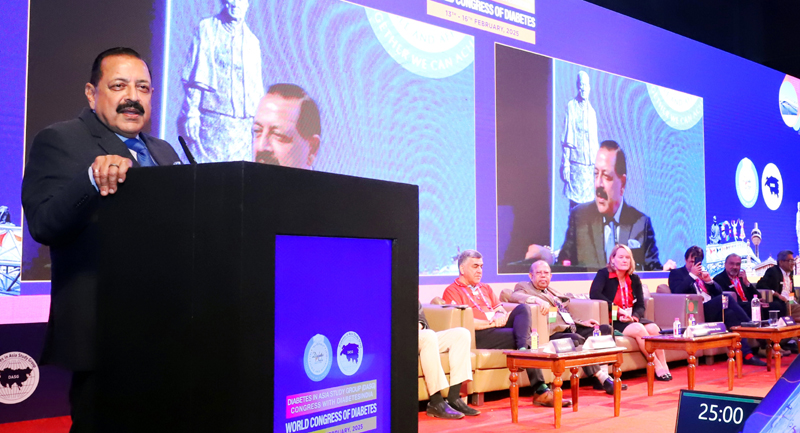Excelsior Correspondent
AHMEDABAD, Feb 15: Union Minister Dr. Jitendra Singh highlighted that Type 2 Diabetes Mellitus is not merely a health concern but a national duty, particularly in a youthful nation like India, which must focus on nurturing its energy for the goal of Viksit Bharat by 2047. He called for a widespread prevention initiative due to the alarming rise of diabetes among younger demographics, emphasizing collaboration between society, the private sector, and government initiatives. Dr. Singh advocated for a comprehensive, technology-driven response to manage the burgeoning diabetes crisis in the country.
In his inaugural address at the “World Diabetes Congress 2025,” hosted by “Diabetes India,” the Minister pointed out the worrying rates of diabetes and pre-diabetes, insisting on the necessity of urgent and coordinated action to avert a public health emergency.
Dr. Jitendra Singh recognized the importance of the Ahmedabad Declaration, drawing parallels to Gujarat’s historical initiative in establishing the first Disaster Management Authority by former Chief Minister Narendra Modi, which eventually led to the creation of the National Disaster Management Authority. He asserted, “India has a history of transforming challenges into opportunities, and diabetes should follow suit.”
He urged the dismantling of barriers between public and private healthcare sectors, academia, and biotech innovators to create a unified, scientifically-based strategy for confronting diabetes. He remarked that the age of isolated work is over; thus, collaboration among government agencies, private research institutions, and startups is vital for early detection, prevention, and management of diabetes.
Dr. Singh announced that the Department of Space and the Department of Biotechnology have established a formal memorandum of understanding (MoU) to investigate human physiology in space, paving the way for innovative diabetes research. This collaboration is anticipated to provide valuable insights into metabolic disorders and their behaviors in zero-gravity environments, potentially influencing diabetes treatment and prevention strategies on Earth.
He emphasized the need for diabetes research and treatment to embrace advancements in biotechnology, AI-powered healthcare solutions, and telemedicine. He cited India’s recent breakthroughs in gene therapy trials for hemophilia, conducted alongside top medical institutions, as an illustration of how pioneering research can transform chronic disease management.
Additionally, he noted that younger populations increasingly face diabetes risks, reinforcing the urgency for India to prevent its workforce from suffering from these metabolic disorders. With 70% of the nation’s populace under 40, prioritizing diabetes prevention is essential for preserving economic productivity and realizing the vision of Viksit Bharat by 2047.
Among the distinguished diabetes experts who addressed the inaugural session were President of the International Diabetes Federation Dr. Peter Shwartz, Padmashri Dr. Shashank Joshi, Dr. Banshi Saboo, the Chief Organiser of the Conference, and RSSDI President Dr. Aravind.


Leave a Reply